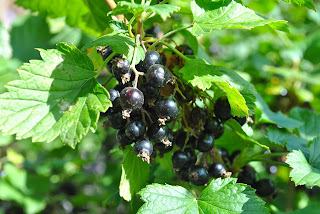This lovely photo is of Sister Mary Placid, who was born in Capbreton, France in 1924. She entered the Benedictine monastery of Poyanne in 1940 before co-founding Transfiguration Monastery in Windsor, N.Y. in 1979. That's where Placid and I met and became friends.
She told me that during the Second World War, when Hitler's Black Shirts took over the monastery guest house, the nuns had to slip out at night asking nearby villagers for something to eat. When a farmer gave Placid a case of apricots, instead of the community eating them, she taught herself some chemistry and turned the fruit into apricot brandy.
One summer day Placid appeared at my home carrying eight dirty "sticks" claiming: "Etienne, these are currant bushes; six red and two black." She stuck them in the ground (carelessly, I thought), said a blessing prayer and within a few days the sticks produced not only leaf buds but flowers which quickly morphed into tiny currants.
She had added that perhaps in a year or so I'd be able to produce Creme de Cassis, a blackcurrant liqueur. When I moved to the retreat house, I dug up the currants and transplanted them here. Every year the robins have gotten the currants before I'm able to get to them. Fussy birds, they consume the red ones first and when they're gone, the black. So now for the first time, down in the cool and dark basement here, there is a large sealed jar of almost two pounds of fermenting black currants. After about ten days I gave the jar a first swirl; the liquid now the consistency of syrup.
While Placid specialized in the fermentation-transformation of all kinds of fruit into wine, she knew we all need (indeed the world needs) transformation, and that the Holy Spirit is the agent of that personal change. Giovanni Papini speaks of this in his 1923 book, Life of Christ.
The first words of Jesus are few and simple, very much like those of St. John, "The time is accomplished; the Kingdom of God is at hand; repent and believe the Gospel." Bare words, incomprehensible to moderns by their very sobriety...It is true that Jesus added "repent," but the old Greek word has been distorted from its true and magnificent meaning. The word of Mark should not be translated "repent"; but rather the changing of the mind, the transformation of the soul. Metamorphosis is a change of form; "metanoia," a changing of the spirit. It ought rather to be translated "conversion," that is, the renewing of the inner life of man (and woman).
As one of the conditions of the arrival of the Kingdom of God and at the same time as the very substance of the new order, Jesus demands complete conversion, a revolution of life and of the common values of life, a transmutation of feelings, of opinions, of intentions. This he called, speaking to Nicodemus, "the second birth." Little by little He was to explain in what way this total transformation of the ordinary human soul is to be effected..."Believe in the Gospel."
A Prayer for Transformation
O Jesus, may I follow you along the Way of Transformation:
learning to feast,
learning your kind of joy.
O Jesus, may I follow you along the Way of Transformation:
not clinging to things,
opinions,
ideas,
people,
places and
traditions that have become lifeless.
O Jesus, may I follow you along the Way of Transformation:
learning silence,
solitude and
inner peace,
gratitude to God for every blessing
and the way of spiritual childhood ~
humility,
trust,
wonder and
even play.
O Jesus, may I follow you along the Way of Transformation:
learning that I am defined not by blood family,
but the family of God's Kingdom-Rule,
that I can be a healer too,
without condemnation and
hatred.
O Jesus, may I follow you along the Way of Transformation:
learning empathy in the pondering of your face ~
the way of generosity and unity ~
unity with God,
unity with others,
unity with myself.
May I accept myself as I am and all the more
as I may become.
O Jesus, may I follow you along the Way of Transformation:
learning that in death I am freed
of my false self ~
my pretend,
exaggerated,
self-protected,
un-surrendered,
controlling self,
and in death my true self emerges and endures ~
that I am God's unique and
dearly loved, no-matter-what, child.
And Jesus, may I follow you along the Way of Transformation:
along that most difficult and seemingly impossible way
of unconditional love ~
that every person is lovable,*
no matter how various,
hypocritical,
failed,
wrong headed,
badly behaved.
Your mercy, Jesus!
Grow me up, Jesus!
~ ~ ~
*Lovable means, I can at least wish everyone well. Some people are tedious, tiresome, burdensome; others do bad things. I am to see them as God sees them - God's child - as God sees me. It can be a real workout, but there it is. Wish them salvation, which means firstly to be saved from their own worst possibilities. We have our own. There are great saints who did awful things at some point in their lives. There are great saints who would have been very difficult to live with. I'm ruined the moment I think (even secretly) "I'm God's completed project, except for a little tidying up around the edges." It also means I likely don't know myself very well.

